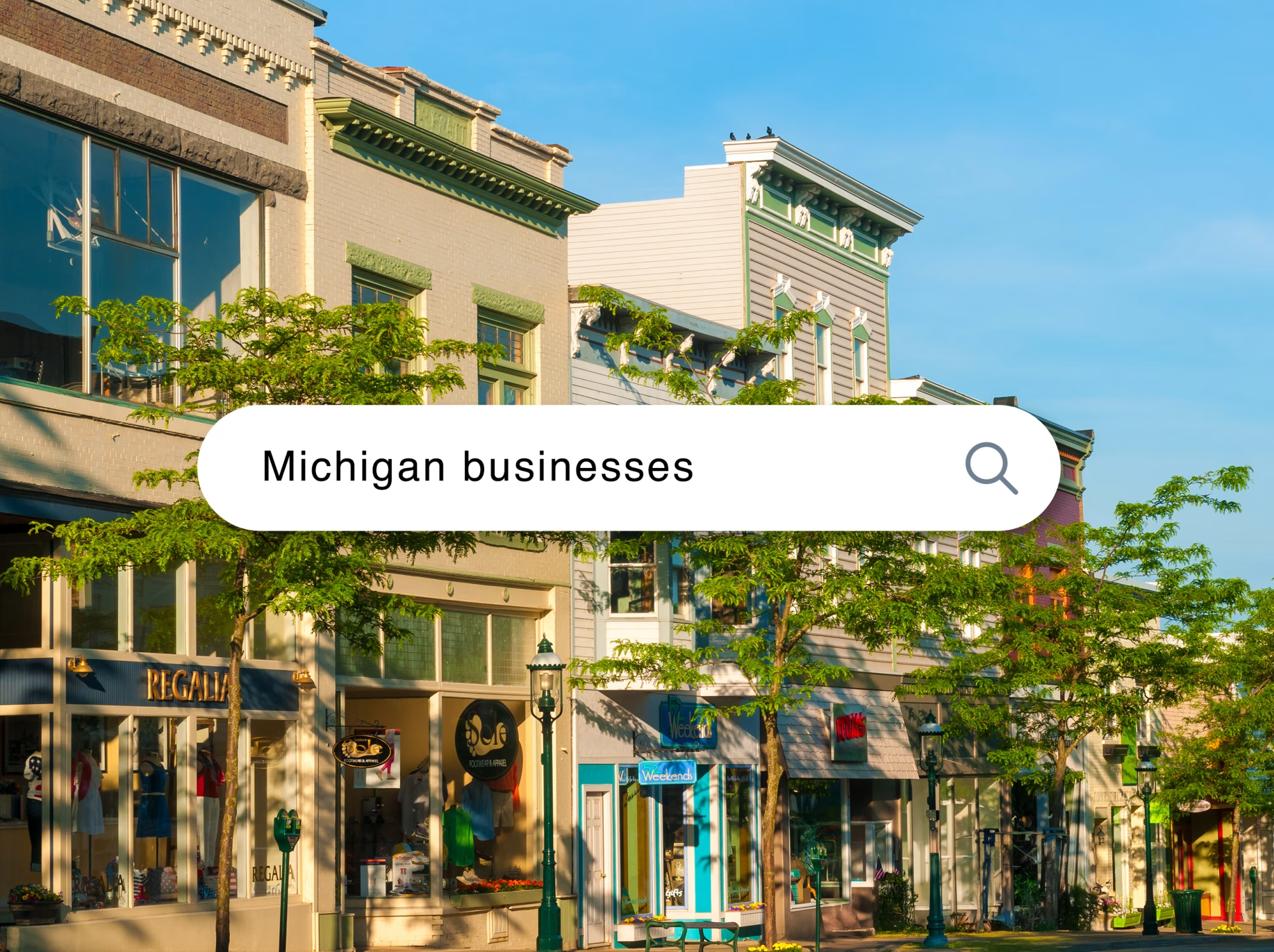
As a small business owner in Michigan, you know that attracting customers is essential to your success. One of the most effective ways to reach potential customers and grow your online presence is through search engine optimization (SEO). SEO is the practice of optimizing your website to rank higher in search engine results pages (SERPs), making it easier for people to find your business when searching for relevant products or services online.
In this guide, we’ll break down the basics of SEO for small businesses and provide you with practical tips to help you get started with optimizing your online presence for search engines.
SEO Basics for Small Businesses
For those short on time, here’s what you need to know:
- Conduct keyword research to identify relevant keywords and phrases
- Optimize your website’s on-page elements (e.g., page titles, headings, content, internal linking, etc.)
- Build high-quality backlinks from reputable websites
- Focus on local SEO by claiming and optimizing your Google Business Profile
- Regularly measure and monitor your SEO efforts
Why SEO Matters for Small Businesses
Before diving into the specifics of SEO, it’s essential to understand why it matters for your small business. Consider these key benefits:
- Increased visibility: By optimizing your website for search engines, you improve your chances of appearing higher in search results, making it more likely that potential customers will find and visit your site.
- Targeted traffic: SEO helps you attract visitors who are actively searching for the products or services you offer, leading to higher quality traffic and potentially more conversions.
- Cost-effective marketing: Unlike paid advertising, SEO focuses on organic search results, which means you can attract customers without paying for each click or impression.
- Competitive advantage: By implementing effective SEO strategies, you can level the playing field and compete with larger businesses in your industry for valuable search engine real estate.
- Long-term benefits: While SEO requires ongoing effort, the results can be long-lasting, providing your business with a steady stream of organic traffic and potential customers over time.
Understanding the Basics of SEO
To effectively optimize your business website for search engines, it’s crucial to understand the basic components of SEO:
Keywords
Keywords are the foundation of any successful SEO strategy. These are the words and phrases that potential customers use when searching for products, services, or information related to your business. By identifying and targeting relevant keywords, you can optimize your website’s content to rank higher in search results for those specific queries.
Keyword Research for Small Businesses
Keyword research is the foundation of a successful SEO strategy. By identifying the keywords and phrases your target audience uses to find businesses like yours, you can optimize your website content accordingly. Here’s how to conduct keyword research for your small business:
- Brainstorm relevant keywords: Start by making a list of words and phrases that describe your products, services, and industry. Consider what your customers might search for when looking for a business like yours.
- Use keyword research tools: Utilize tools like Google Keyword Planner, SEMrush, or Ahrefs to research keyword ideas, search volume, and competition level. These tools can help you identify valuable keywords to target.
- Analyze competitor keywords: Look at the websites of your top competitors to see which keywords they are targeting. This can provide insights into valuable keyword opportunities for your own business.
- Consider long-tail keywords: Long-tail keywords are longer, more specific phrases that typically have lower search volume but higher conversion rates. Targeting long-tail keywords can be especially effective for small businesses with niche offerings.
- Prioritize keywords: Once you have a list of potential keywords, prioritize them based on relevance, search volume, and competition level. Focus on keywords that are most closely aligned with your business and have a good balance of search volume and competition.
On-Page Optimization
On-page optimization involves optimizing individual web pages to rank higher and earn more relevant traffic. This includes optimizing elements like page titles, headings, content, and internal linking. By improving these on-page factors, you can help search engines better understand your website’s content and structure, leading to higher rankings and more targeted traffic.
On-Page Optimization Tips
On-page optimization involves optimizing individual web pages to rank higher and earn more relevant traffic. Here are some key on-page optimization tips for small businesses:
- Optimize page titles and meta descriptions: Write compelling, keyword-rich page titles and meta descriptions to improve click-through rates from search results.
- Use header tags: Structure your content using header tags (H1, H2, H3) to help search engines understand the hierarchy and main topics of your pages.
- Optimize content: Create high-quality, informative, and engaging content that naturally incorporates your target keywords. Focus on providing value to your readers while optimizing for search engines.
- Use internal linking: Link to other relevant pages on your website to help search engines understand your site structure and distribute link equity.
- Optimize images: Include descriptive file names and alt text for your images to help search engines understand their content and improve accessibility.
Off-Page Optimization
Off-page optimization refers to activities that take place outside of your website to improve your search engine rankings. This primarily involves building high-quality backlinks from other reputable websites. Backlinks act as a vote of confidence, telling search engines that other websites consider your content valuable and relevant.
Building High-Quality Backlinks
Backlinks are links from other websites that point to your site. They act as a vote of confidence, telling search engines that other websites consider your content valuable and relevant. Building high-quality backlinks is a crucial component of off-page optimization.
Here are some strategies for building backlinks:
- Create valuable content: Develop informative, engaging, and shareable content that other websites will want to link to naturally.
- Reach out to industry websites: Identify reputable websites in your industry and reach out to them about potential linking opportunities, such as guest blog posts or resource listings.
- Leverage local directories: Submit your business to relevant local directories and online listings to build backlinks and improve local SEO.
- Engage in community outreach: Participate in local events, sponsor community organizations, and partner with other businesses to earn backlinks and build brand awareness.
- Monitor your backlink profile: Regularly monitor your website’s backlink profile to identify any low-quality or spammy links that could negatively impact your search engine rankings. Use tools like Google Search Console or Ahrefs to keep track of your backlinks.
Local SEO
For small businesses serving a specific geographic area, local SEO is crucial. This involves optimizing your website and online presence to rank higher for local search queries and appear in local search results. By focusing on local SEO, you can attract more customers from your target area and improve your visibility in local search.
Tips to Build Local SEO for Michigan Small Businesses
For small businesses serving a specific geographic area, local SEO is essential. Here are some tips to optimize your online presence for local search:
- Claim and optimize your Google Business Profile listing: Create and verify your Google Business Profile, ensuring that your business name, address, phone number, and other details are accurate and up-to-date.
- Include local keywords: Incorporate location-specific keywords (e.g., “Detroit wedding photographer” or “Dexter pizza delivery”) into your website content, meta tags, and online profiles.
- Encourage customer reviews: Encourage customers to leave online reviews on your Google Business Profile listing and other relevant platforms to improve your local search visibility and build trust with potential customers.
- Build local citations: Ensure that your business name, address, and phone number (NAP) are consistently listed across online directories, local listings, and industry-specific platforms.
- Create local content: Develop blog posts, videos, or other content that focuses on local events, news, or attractions to demonstrate your expertise and connection to the community.
Technical SEO
Technical SEO focuses on optimizing the technical aspects of your website to improve search engine visibility and user experience. This includes factors like site speed, mobile-friendliness, site structure, and security. By ensuring that your website is technically sound, you can improve your search engine rankings and provide a better experience for your users.
Measuring and Monitoring SEO
Success Implementing SEO strategies is just the beginning. To ensure ongoing success and identify areas for improvement, it’s essential to measure and monitor your SEO efforts regularly. Use tools like Google Analytics and Google Search Console to track key metrics, such as:
- Organic traffic: Monitor the number of visitors coming to your website from organic search results to gauge the effectiveness of your SEO efforts.
- Keyword rankings: Track your website’s rankings for target keywords to identify progress and areas for improvement.
- Conversion rates: Measure the percentage of organic search visitors who complete desired actions, such as making a purchase or filling out a contact form, to assess the quality of your traffic and the effectiveness of your website’s content and design.
- Bounce rates: Analyze the percentage of visitors who leave your website after viewing only one page to identify potential issues with content relevance or user experience.
- Backlink profile: Regularly review your website’s backlink profile to ensure that you are earning high-quality, relevant links and to identify any potentially harmful links that may need to be disavowed.
Conclusion
Implementing basic SEO strategies is essential for Michigan small businesses looking to attract more customers and grow their online presence. By understanding the fundamentals of SEO, conducting thorough keyword research, optimizing your website’s on-page elements, building high-quality backlinks, and focusing on local SEO, you can improve your search engine rankings and reach more potential customers.
Remember, SEO is an ongoing process that requires consistent effort and attention. Stay up-to-date with the latest best practices, regularly monitor your website’s performance, and continually refine your strategies based on data and insights. By making SEO a priority for your small business, you can level the playing field, compete with larger businesses, and ultimately drive long-term success in the digital landscape.
Frequently Asked Questions
SEO, or search engine optimization, is the practice of optimizing your website to rank higher in search engine results pages (SERPs) for relevant keywords and phrases. By improving your website’s visibility in search results, you can attract more organic traffic, reach potential customers, and grow your business online. SEO involves a combination of on-page optimization, off-page optimization, and technical best practices to improve your website’s relevance, authority, and user experience in the eyes of search engines like Google.
To improve SEO for small businesses, focus on conducting thorough keyword research to identify relevant keywords and phrases your target audience uses when searching for businesses like yours. Optimize your website’s on-page elements, such as page titles, headings, content, and internal linking, to improve search engine rankings and user experience. Build high-quality backlinks from reputable websites to demonstrate your site’s authority and relevance. Prioritize local SEO by claiming and optimizing your Google Business Profile listing, incorporating local keywords, and building local citations. Finally, regularly measure and monitor your SEO efforts using tools like Google Analytics and Google Search Console to track progress and identify areas for improvement.
To find keywords for SEO, follow these key steps:
– Start by brainstorming words and phrases that describe your products, services, and industry.
– Use keyword research tools like Google Keyword Planner, SEMrush, or Ahrefs to identify high-volume, low-competition keywords that align with your business goals.
– Analyze your competitors’ websites to see which keywords they are targeting and identify potential keyword gaps.
– Consider long-tail keywords, which are longer, more specific phrases that often have lower search volume but higher conversion rates.
– Prioritize your keyword list based on relevance, search volume, and competition level, focusing on keywords that are most closely aligned with your business and have a good balance of search volume and competition.
The four pillars of SEO are on-page optimization, off-page optimization, technical SEO, and content. On-page optimization involves optimizing individual web pages, including elements like page titles, headings, content, and internal linking, to improve search engine rankings and user experience. Off-page optimization primarily focuses on building high-quality backlinks from reputable websites to demonstrate your site’s authority and relevance. Technical SEO ensures that your website is technically sound, addressing factors like site speed, mobile-friendliness, site structure, and security. Content is the foundation of SEO, as creating high-quality, informative, and engaging content that naturally incorporates target keywords helps attract and retain visitors while signaling relevance to search engines.
To improve SEO as a beginner, follow these basic steps:
– Start by familiarizing yourself with the basics of SEO, including keyword research, on-page optimization, off-page optimization, and technical best practices.
– Conduct thorough keyword research to identify relevant keywords and phrases to target in your website’s content and meta tags.
– Optimize your website’s on-page elements, such as page titles, headings, and content, to improve search engine rankings and user experience.
– Focus on creating high-quality, informative, and engaging content that naturally incorporates your target keywords and provides value to your audience.
– Build high-quality backlinks from reputable websites to demonstrate your site’s authority and relevance.
– Finally, regularly measure and monitor your SEO efforts using tools like Google Analytics and Google Search Console to track progress and identify areas for improvement.
More From the Online Presence Series
- How to Manage Online Business Reviews
- How to Set Up a Google Business Profile: Step-by-Step
- Website Basics for Michigan Small Businesses
- Your Michigan Business Needs an Online Presence: Here’s Where to Start












 8123 Main St Suite 200 Dexter, MI 48130
8123 Main St Suite 200 Dexter, MI 48130


